🎗️Lonny's War Update- October 681, 2023 - August 17, 2025 🎗️
🎗️Day 681 that 50 of our hostages are still in Hamas captivity🎗️
The entire negotiating style and process from Netanyahu is a circus of diversion and confusion. Since the beginning of the war, he has been the one insisting on a phased interim agreement every step of the war, a creature of is invention, which had 2 aspects that he refused to do without. It had the aspect of phases, which provided him with jump off points at any time he wanted and which wold serve him politically, and the second aspect was stretching out every negotiation and every deal over long periods of time, also for his political advantage. Everything was about his political survival, not the hostages, not the soldiers and certainly not for the best interests of the country. As a result of his stubborn insistence on this kind of horrible deal, he took everyone by surprise when he changed his spots and suddenly said that he will only accept a comprehensive deal that would bring home all the hostages and end the war. This is what Hamas has wanted to do for over a year. My bother has that commitment from Hamas in writing in Arabic and English. However, Netanyahu's demands include some demands that Hamas will never agree to, with the main one being disarming under the occupation by Israel. It appears that all the other demands of both Netanyahu and Hamas can probably be worked out through certain flexibility and compromise. The demand of disarming under Israeli occupation is likely the one issue that Hamas will not be flexible with. It is fully expected and most likely already agreed up that Hamas will disarm under and Palestinian governing body.
Right now, there is such mayhem in the negotiations. The negotiating partners are still trying to close on the previous Witkoff proposal of a 60 day ceasefire where only about half of the hostages (living and dead) will be released and certain pullbacks by the IDF, but Netanyahu and his people have made it clear that this is now unacceptable, only a comprehensive deal. So the partners are trying to make it the first part of a complete deal and the second part will contain the remaining parts that will bring the rest of the hostages home and end the war. Hamas appears confused and doesn't know if they are negotiating an interim deal or a comprehensive one.
In any case, as my brother has written (link), the only person Hamas should be closing a deal with is Trump who, then should bring it to Netanyahu as a fait accompli and tell him this is the deal. Trump is the only person Netanyahu cannot say no to.‘A day to save lives’: Bereaved families, relatives of hostages launch nationwide strike
Israelis bereaved in the war and the families of hostages launch a nationwide strike to protest the expansion of the war in Gaza rather than striking a deal to free those held by Hamas.
“I’m here this morning to ask every Israeli citizen to act today to save lives,” says Reut Recht-Edri, mother of Ido Edri, who was murdered at the Nova music festival during the Hamas-led attack on October 7, 2023. “To stop everything, to leave home and to fight for the return of all the hostages, for saving the soldiers, for our state of Israel.”
The strike began this morning and will continue throughout the day with protests and actions at 400 locations across the country, say participants in the press conference, held by the October Council opposite the Kirya military headquarters in Tel Aviv.
It is endorsed by thousands of businesses, local authorities and some unions. Hostages Square in Tel Aviv is expected to see 1 million visitors.
The strike comes after a government decision to expand the war by invading Gaza City. Relatives of hostages are calling on the government instead to end the war with a comprehensive deal to free all of the 50 remaining hostages, at least 20 of whom are thought to be alive.
“We’re united in a simple demand for the government of Israel to put on the table today an Israeli outline for a comprehensive deal to end the war in exchange for the last hostage, ” says Naomi Abir, mother of Lotan, an American-Israeli who was killed at the Nova festival. “Without these conditions, we know the other side won’t accept.”
Lishay Miran Lavi, whose husband Omri is held in Gaza says “today is just the beginning.”
“We intend to escalate the struggle. We have no other choice,” she says.
Sister of Shiri Bibas says government ‘destroying Israeli society in the name of political survival’
Dana Silberman Sitton, sister and aunt of the murdered hostages Shiri, Ariel, and Kfir Bibas, tells a rally at Tel Aviv’s Hostages Square that the country must fight “apathy” as the war continues.
Sitton speaks to the packed crowd ahead of a called general strike Sunday for the release of the 50 hostages still held in Gaza and against a planned invasion of Gaza City.
She says the government is “destroying Israeli society in the name of political survival.”
“We’ll keep fighting the external enemy but also the internal apathy, and demand the most basic thing: justice, truth, and human life,” she says.
She adds, “If the country doesn’t wake up now, it will wake up to a total moral destruction.”
The Bibas family, parents Yarden and Shiri, and young sons Ariel and Kfir, were taken hostage in the Hamas-led October 7, 2023, massacre and became perhaps the most prominent faces of the hostages’ plight. Yarden was released alive during a ceasefire earlier this year, and shortly afterward, the bodies of Shiri, Ariel, and Kfir were returned after having been murdered in captivity.
In first, sister of Nepali hostage addresses Hostages Square: ‘Prayers are not enough’
Pushpa Joshi, the sister of the Nepali hostage Bipin Joshi, speaks at a demonstration in Tel Aviv’s Hostages Square.
Bipin Joshi, an agriculture student, was taken captive from Kibbutz Alumim by Hamas terrorists on October 7, 2023.
A number of protesters in the crowd wave Nepali flags in solidarity with Pushpa and her mother, Padma, who arrived in Israel last week for the first time.
“My brother is a student who was caught in a war he has no side in. It took us 22 months to find the strength to come here,” says the captive’s 17-year-old sister.
“We were isolated in Nepal, separated by language, culture, and fear. We focused on prayers for him, but prayers are not enough,” she says.
Joshi hints that the recent videos of hostages Rom Braslavski and Evyatar David, where the two Hamas hostages appeared emaciated and in dire health, acted as an impetus for their visit.
She adds that the footage “shattered us. My mom and dad are devastated, barely holding on.”
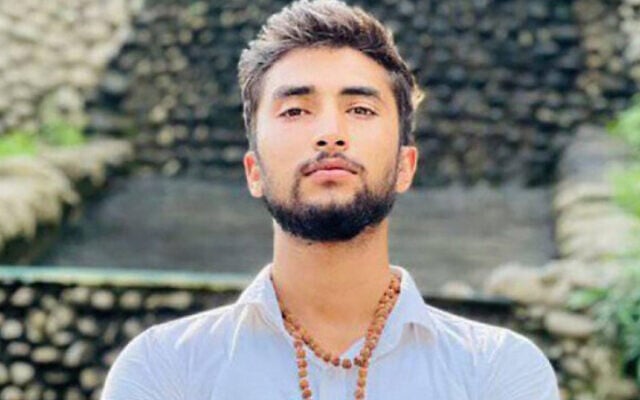 Bipin Joshi, a Nepali farming student, was taken captive from Kibbutz Alumim on October 7, 2023, by Hamas terrorists. (Courtesy)
Bipin Joshi, a Nepali farming student, was taken captive from Kibbutz Alumim on October 7, 2023, by Hamas terrorists. (Courtesy)“Almost two years without a sign of life. Is he starving? Wounded? Alive?” she asks, struggling to speak through tears.
In Nepali, Joshi addresses her brother: “I miss you so much, brother. Don’t lose hope, be strong, stay alive.”
Einav Zangauker says nationwide strike tomorrow ‘only the beginning’
Einav Zangauker, mother of Hamas-held hostage Matan Zangauker, says a nationwide strike tomorrow for a hostage deal is “only the beginning.”
She makes the remarks at a rally on Tel Aviv’s Begin Road for the release of the hostages.
“Tomorrow morning we’ll stop the country,” says Zangauker, one of the most outspoken activists for a hostage deal. She says the strike will be both for the 50 hostages still held in Gaza, at least 20 of whom are thought to be alive and 28 confirmed dead, and the soldiers fighting in Gaza.
“We’ll stop the country tomorrow for our lives here, for our children, for the state of Israel,” she says. “We can’t take any more.”
The strike is endorsed by a range of local authorities, universities, companies, and unions, including the chair of the airport employees’ union. It is not endorsed by the powerful Histadrut labor union.
“Tomorrow is only the beginning,” Zangauker says. “We’ve stopped waiting for [Prime Minister Benjamin] Netanyahu to stop the war when it’s convenient for him politically.”
“We demand quiet, security, a future, and the end of the war in a comprehensive deal,” she says
Hostage’s father calls on demonstrators in Tel Aviv to join strike tomorrow
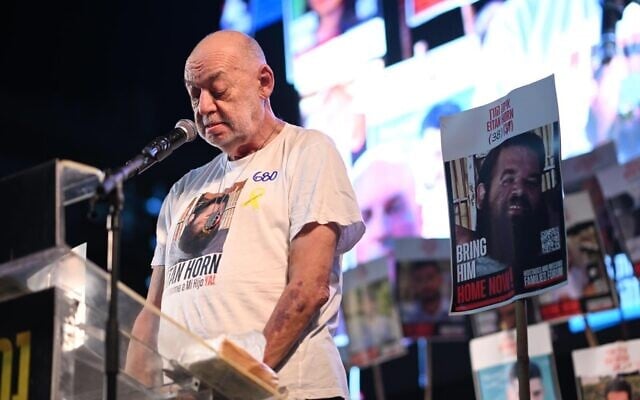 Itzik Horn, the father of Hamas hostage Eitan Horn, speaks to a hostage protest in Tel Aviv's Hostages Square on August 16, 2025. (Hostages and Missing Families Forum)
Itzik Horn, the father of Hamas hostage Eitan Horn, speaks to a hostage protest in Tel Aviv's Hostages Square on August 16, 2025. (Hostages and Missing Families Forum)The father of hostage Eitan Horn calls on demonstrators in Tel Aviv to join in the day-long strike demanding a hostage deal and an end to the war, set to take place tomorrow across the country.
“Tomorrow, Israel will come to a halt, and I call on everyone to participate. This is not a vacation day to pass time in the malls, it is a day to cry out,” says Itzik Horn from the stage in Hostages Square. “It is not just a day to empathize with the hostage families, but a civil demonstration to protect the State of Israel’s moral character.”
Horn’s son, Eitan, was taken hostage alongside his brother, Iair, by Hamas terrorists from Kibbutz Nir Oz on October 7, 2023. Iair Horn was released in February this year in a hostage-ceasefire deal, but Eitan remains in captivity.
Horn accuses the government of neglecting the hostages, questioning how the cabinet could agree on a plan to expand the fighting in Gaza after “seeing the videos of starvation and the difficult testimonies of the hostages who were returned home, [describing] the immense suffering, the torture, the psychological terror.”
If Israel’s political leadership indeed decides to pursue its plan to take over Gaza City, “why don’t they have the courage to go out publicly and announce their choice of my son Eitan’s death?” Horn asks bitterly.
“As we demonstrate, they accuse us of hurting our loved ones and playing into the hands of Hamas,” he continues. “[But] how does the conflict between the Defense Minister and the Chief of Staff help bring Eitan and the rest of the hostages back?”
He poses a question to the crowd, which doubles as a popular protest chant: “Why are they still in Gaza?” Then provides his answer: “They are there because the leadership doesn’t want to return them home; the time has come to bring them back.”
In fierce rebuke, Netanyahu says strike is ‘distancing the release of our hostages’
Smotrich condemns strike for hostages as ‘bad campaign that plays into Hamas’s hands’
This from the F**king moron who repeatedly called Hamas an asset to Israel- Hostage Families Forum responds to Netanyahu: '22 months they are rotting in Gaza - on your watch'
The Hostage Families Forum responded to statements made by Prime Minister Benjamin Netanyahu at the government meeting, according to which "those calling for an end to the war ensure that October 7 will happen again," saying: "Netanyahu, for 22 months the hostages have been rotting in Gaza - on your watch. Instead of deceiving the public, spreading spin and defaming the hostage families, return our loved ones in a deal and end the war. This is the only resolution that the people of Israel demand, and this is the only possible resolution. Today all of Israel knows there were many opportunities to bring back the hostages." link Whenever it seems that Netanyahu cannot get any lower, he succeeds in surpassing himself. It doesn't surprise us anymore because he has succeeded so well in reaching new depths of depravity every step of the way in the last 2 years. At this point, our only hope regarding him is that he stops digging to reach new low points. There is overall knowledge and understanding that Netanyahu could have brought all of the hostages home long ago if only he wanted to and if he was a real leader, and not just a narcissistic megalomaniac who believes that he and only he is entitled to 'rule' Israel. If one of his sons was taken hostage on October 7, all of the hostages would have been home on October 8. That is one of the many crimes against the Israeli people that Netanyahu is so very guilty of committing, not once but everyday for 681 days and counting. And he compounds that crime with every horrendous statement like this and for every act committed against the hostage families and supporters that he and his poison machine have perpetrated every day since October 7. His family's poison machine is one of the most well oiled tactical operating organizations in the country today with its sole purpose of keeping Netanyahu in power. His parasitic son, who lives in luxury in Miami on our tax money and his cruel shrew wife are 'top officers' in that poison machine who direct much of the actions that come out of it. If only they would have used the power of that machine just a little for the good of the hostages, they would have been home a long time ago. Following Netanyahu's statement against the demonstrations, we will certainly see that poison machine geared up for heavy action against the demonstrations, the protestors and worst of all, against the hostage families. We will see it in the social media and it has already been proven that most of the posts in social media by this poison machine are bots from around the world and by fictional people who all support Netanyahu and post against anything and anyone who is not in his orbit. Just last week, after his parasitic, conspiracy loving son posted that the IDF Chief of Staff was mounting a military coup against his father, a massive social media attack on the IDF chief occurred. Under investigative news channels, it was found that over 75% were from bots around the world. That is how this family works against the State and people of Israel. Only their position is important and everyone else can go to hell.
**There is nothing more important than getting them home! NOTHING!**
“I’ve never met them,But I miss them. I’ve never met them,but I think of them every second. I’ve never met them,but they are my family. BRING THEM HOME NOW!!!”
There is no victory until all of the hostages are home!אין נצחון עד שכל החטופים בבית
Red Alerts - Missile, Rocket, Drone (UAV - unmanned aerial vehicles), and Terror Attacks and Death Announcements
*4:15pm - Central Israel and Jerusalem areas - ballistic missile from Yemen while hundreds of thousands are in the street demonstrating for the hostages and to end the war - missile successfully intercepted - nor reports of injuries or damage- Missile attack expected after we attacked the Houthis in Yemen last night
Released hostage Arbel Yehoud: Military pressure ‘only kills’ captives
Released hostage Arbel Yehoud addresses the crowd at Tel Aviv’s Hostage Square during the daylong protest being held as part of the nationwide strike opposing the government’s decision to expand the war in Gaza rather than negotiate a deal to return the remaining hostages.
“I know firsthand what it’s like to be in captivity. I know that military pressure doesn’t bring hostages back — it only kills them. The only way to bring them back is through a deal, all at once, without games,” she says.
Yehoud describes the suffocating conditions underground, “without water, without air, without the ability to breathe,” and says that today’s strike cannot remain a one-time event.
“We need to stop normal life again and again until those in captivity return. You’ve seen the photos, the videos, the horrors. How much longer will you continue to close your eyes? There is only one way to bring them all back: a deal now,” she adds.
Yehoud spent 482 days in captivity before being released in January during the most recent ceasefire deal. Her partner, Ariel Cunio, remains a hostage along with his brother David Cunio and 48 others.
Yehoud is accompanied by David’s wife, released hostage Sharon Aloni-Cunio, who was freed in November 2023 with their two daughters, Yuli and Emma; and by Eitan Cunio, brother of Ariel and David; and Yarden Bibas, David’s best friend.
Bibas was released from captivity in January. His wife Shiri and their children Ariel, 4, and baby Kfir, were also taken hostage, then murdered in captivity in Gaza.
32 detained during nationwide protests for hostages’ release, police say
Police announce that they have detained 32 protesters across the country amid demonstrations demanding the release of Israeli hostages and an end to the war in Gaza.
The protests, many of which have blocked major highways, are part of a nationwide strike organized by the families of hostages and victims of Hamas’s October 7, 2023, massacre.
The bulk of detained demonstrators had been protesting on Begin Road and Ayalon Highway in Tel Aviv. Seven others were arrested in Jerusalem for blocking roads during a march throughout the city.
The three hour-long march in the capital has since ended, after the demonstrators were stopped on their way to Prime Minister Benjamin Netanyahu’s residence on Azza Street. Police closed a section of the street to both cars and pedestrians in light of the mass protests.
Police use water cannon on protesters blocking key Jerusalem tunnelPolice have arrested seven demonstrators in Jerusalem so far, a law enforcement official says.
Police dragged the protesters from the pavement after dousing them with a water cannon in a key tunnel leading into the capital.
The protest is now continuing down Route 16 toward the direction of Azza Street, where the prime minister’s residence is located.
“Arrest me, but the protest movement will continue,” says a detained protester on the side of the road outside the tunnel, as two plainclothes cops encircle him on the sidewalk.
Earlier, police had said 25 were arrested across the country. The protests are part of a nationwide strike for the release of the hostages held in Gaza and against the government’s plan to conquer Gaza City.
Lapid visits Hostages Square during strike: ‘They won’t stop us’
Opposition Leader Yair Lapid visits Hostages Square to voice support for hostage families and criticize the government during today’s nationwide strike to call for the release of Gaza hostages and an end to the war.
“We are shutting down the country today,” Lapid says in a video message delivered in the plaza in Tel Aviv as it fills with demonstrators, which he then posts on X.
“Because our hostages are not pawns that the government is allowed to sacrifice for the sake of the war effort — they are citizens that the government must return to their families,” the Yesh Atid chair continues.
“They won’t stop us, they won’t tire us, they won’t exhaust us, we’ll continue to fight until the hostages return home, there’s a deal, the war ends,” he adds.
In a post on X, Blue and White-National Unity chairman Benny Gantz also expresses support for the families and appears to take the government to task for condemning them after several cabinet ministers criticize the strike.
“To attack the families of the hostages – when you bear responsibility for their children being held captive by Hamas for nearly two years – weakens and divides us,” he writes. “To support them – that is what strengthens us and them.”
Crowds protest at homes of cabinet ministers as part of nationwide strike for hostages
A few dozen demonstrators gather near Strategic Affairs Minister Ron Dermer’s home in Jerusalem to protest for a hostage deal and an end to the war.
Protesters also gather at the homes of Education Minister Yoav Kisch and Economy Minister Nir Barkat, as well as Deputy Foreign Minister Sharren Haskel.
Kisch blasts Israeli folk music over the chants of the protesters. link Kisch's actions are so typical of these ministers and the entire government that is purposely blind and deaf to what is actually happening in Israel. Any supportive statements are superficial, at best, and none of them are ever followed up with action such as demanding that a deal be made and the war end. They, like the education minister, who's actions are non education-like, want to drown out the 'noise' of the hostages, the families and the supporters and make believe everything is normal. Nothing is normal but for them, we are on October 6 and October 7 was a minor blip that just happened while they are part of the government. There is a special place in hell for all of them.
Relatives of hostages plan to set up protest encampment tomorrow on Gaza border
Relatives of Israeli hostages held in Gaza announce that they will set up a tent encampment on the Gaza border as part of ongoing protests on behalf of their loved ones.
The encampment will go up tomorrow under the name “Waypoint 50,” a reference to the 50 captives held by terror groups in Gaza, at least 20 of whom are thought to be alive.
The announcement comes amid a nationwide strike today called by relatives of the hostages to call for their release and protest the planned expansion of the war in Gaza.
The Hostages and Missing Families Forum says that the encampment will be set up “at the point closest to the 50 hostages on the Gaza border.” It does not specify where that location will be. The hostages are not thought to be held together.
The announcement says families of the captives will “sleep there, fight there, and from there declare the coming actions of the struggle to bring back their loved ones.”
A statement from the families says, “The obtuseness of the government… obligates us to intensify the struggle and do everything to bring back our loved ones.”
Israel to resume supply of tents, shelter equipment to Gaza ahead of expanded op
COGAT says tents to be delivered to southern Strip as part of ‘preparations to move the population’ from Gaza City; IDF chief set to review army’s plans as troops push into Zeitoun
Children play at a tent camp for displaced Palestinians in Gaza City, August 3, 2025. (AP Photo/Jehad Alshrafi)Israel announced that it will renew the supply of tents and shelter equipment to Gaza beginning on Sunday, ahead of plans by the military to evacuate the Palestinian civilian population of Gaza City.
Saturday’s announcement came as Israel prepares for a military operation to conquer the Gaza Strip’s largest city, which was approved by the cabinet last week, despite hesitation from the military.
According to the Coordinator of Government Activities in the Territories (COGAT), the Defense Ministry body that deals with humanitarian aid, the tents and shelter equipment will be sent into Gaza via the Kerem Shalom Crossing by the United Nations and other international bodies, following a “thorough security inspection” by Israeli authorities.
COGAT said the move was being carried out “in accordance with the directive of the political echelon, and as part of the IDF’s preparations to move the population from combat zones to the southern Gaza Strip for their protection.”
The Israeli government has instructed the IDF to ready to capture Gaza City, where an estimated one million civilians are sheltering. The civilians will be instructed to head to southern Gaza for their safety, according to officials.
Israel resumed humanitarian aid deliveries to Gaza on May 19, after a pause since March 2, but until now, none of the deliveries have included shelter equipment, which has not been allowed for 26 weeks.
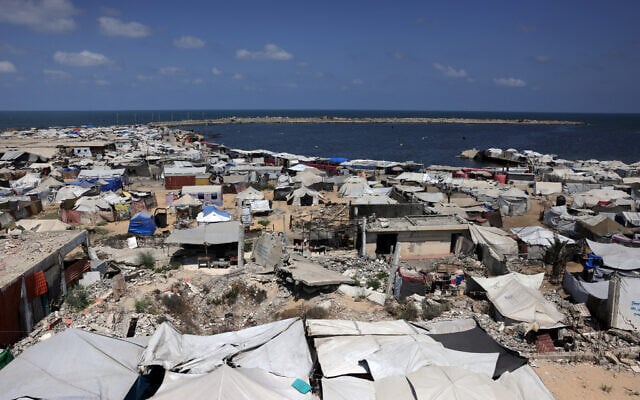 Tents used as temporary shelters by displaced Palestinians are set up around war-damaged structures along the beach in Gaza City on August 8, 2025. (Bashar Taleb/AFP)
Tents used as temporary shelters by displaced Palestinians are set up around war-damaged structures along the beach in Gaza City on August 8, 2025. (Bashar Taleb/AFP)Alongside the announcement of renewed tent deliveries to the Strip, the Prime Minister’s Office gave special permission to Indonesia to airdrop humanitarian aid to Gaza, the Kan public broadcaster reported on Saturday.
Indonesia, the country with the largest Muslim population in the world, does not have relations with Israel.
In response to the report, a diplomatic official told Kan, “Prime Minister [Benjamin] Netanyahu invites all countries that request to airdrop food to Gaza to join the humanitarian effort.”
With the move, Indonesia joined fellow southeast Asian nation Singapore, as well as Canada, Jordan, the United Arab Emirates, Germany, Belgium, France, Spain, Greece and Italy, as well as Israel, in the effort to airdrop aid into Gaza since Israel reinstated the policy last month, amid mounting international criticism over hunger in Gaza.
Airdrops are only able to deliver a small fraction of what can come into Gaza by land via trucks, and they also pose safety risks for the civilians who can be hit by the packages from above.
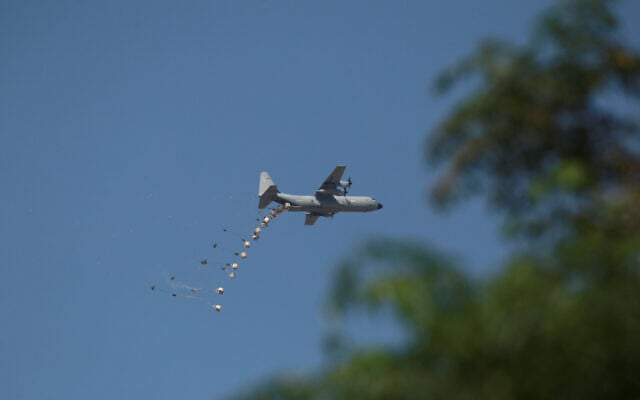 A military plane parachutes aid packages near Jabalia in the northern Gaza Strip on August 14, 2025. (Bashar TALEB / AFP)
A military plane parachutes aid packages near Jabalia in the northern Gaza Strip on August 14, 2025. (Bashar TALEB / AFP)Zamir to review Gaza City capture plans Sunday
Ahead of the start of the IDF’s mission to capture Gaza City, Chief of Staff Lt. Gen. Eyal Zamir was set to visit the Southern Command on Sunday to review the army’s operational plans, according to military officials.
The plans, based on a general outline green-lit by Zamir last week, were set to be discussed at the Southern Command Saturday night.
If approved, Zamir will present the plans to Defense Minister Israel Katz, likely later in the day.
The IDF is currently carrying out an operation in the Zeitoun neighborhood, on the outskirts of Gaza City. For the major offensive, the military will need to call up reservists.
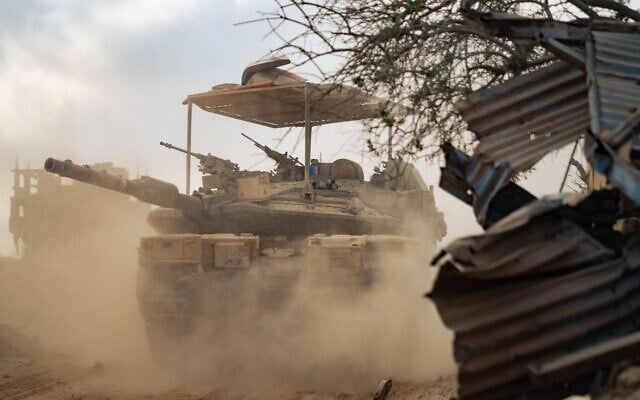 IDF troops operate in the Zeitoun neighborhood of Gaza City, in a handout photo issued on August 15, 2025. (Israel Defense Forces)
IDF troops operate in the Zeitoun neighborhood of Gaza City, in a handout photo issued on August 15, 2025. (Israel Defense Forces)As the army pushes into Zeitoun, Gaza’s Hamas-run civil defense agency said that Israeli attacks killed at least 39 people on Saturday, warning that intensifying strikes on the Gaza City neighborhood were placing its remaining residents in mortal danger.
Civil defense spokesman Mahmud Bassal said conditions in Zeitoun were rapidly deteriorating, with neighborhood residents having little to no access to food and water amid heavy Israeli bombardment.
He said that about 50,000 people were estimated to be in that area of Gaza City, “the majority of whom are without food or water” and lacking “the basic necessities of life.”
Media restrictions in Gaza and difficulties accessing swaths of the Palestinian territory mean AFP is unable to independently verify the tolls and details provided by the civil defense agency, the Israeli military, and other sources.
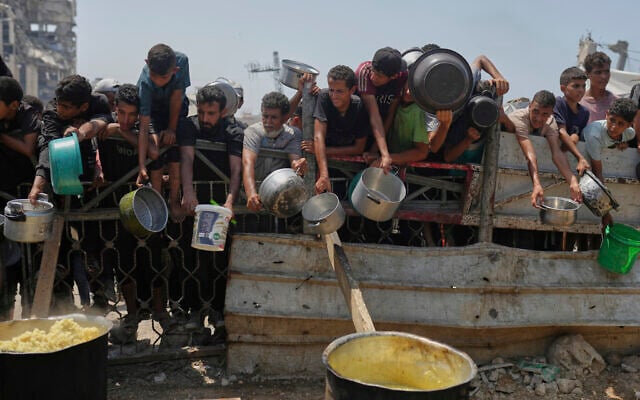 Palestinians struggle to get donated food at a community kitchen in Gaza City, northern Gaza Strip, August 16, 2025. (AP Photo/Jehad Alshrafi)
Palestinians struggle to get donated food at a community kitchen in Gaza City, northern Gaza Strip, August 16, 2025. (AP Photo/Jehad Alshrafi)In recent days, Gaza City residents have told AFP of more frequent airstrikes targeting residential areas, including in Zeitoun, while earlier this week, the Hamas terror group denounced “aggressive” Israeli ground incursions.
To Bassal, Israel was carrying out “ethnic cleansing” in Zeitoun.
Israeli officials have dismissed similar accusations before, and the military insists it abides by international law.
According to the civil defense agency, at least 13 of the Palestinians killed Saturday were shot by troops as they were waiting to collect food aid near distribution sites in the north and in the south.
IDF drone crashes in Gaza City
Earlier Saturday, a small Israeli military surveillance drone crashed in the Rimal neighborhood of Gaza City, according to Palestinian media and the IDF.
The military said the unmanned aerial vehicle, a Skylark 3 model, was on a reconnaissance mission when it made an “emergency landing in the northern Gaza Strip following a technical malfunction.”
There was no fear of information leaking from the device, the IDF added.
The Skylark is a tactical surveillance drone created by Elbit Systems and operated by the IDF’s Artillery Corps. Many Skylark UAVs have crashed in hostile territory over the years. LinkSome Gazan families turn to drinking unclean water as they battle heat, thirst
As UN agencies report rising number of illnesses from contaminated water, COGAT says ‘water is available from Israeli pipelines, water pumping facilities, and desalination plants’
DEIR AL-BALAH, Gaza Strip — After waking early to stand in line for an hour under the August heat, Rana Odeh returns to her tent with her jug of murky water. She wipes the sweat from her brow and strategizes how much to portion out to her two small children. From its color alone, she knows full well it’s likely contaminated.
Thirst supersedes the fear of illness.
She fills small bottles for her son and daughter and pours a sip into a teacup for herself. What’s left she adds to a jerrycan for later.
“We are forced to give it to our children because we have no alternative,” Odeh, who was driven from her home in Khan Younis, said of the water. “It causes diseases for us and our children.”
Such scenes have become the grim routine in al-Mawasi, a sprawling displacement camp in central Gaza where hundreds of thousands endure scorching summer heat. Sweat-soaked and dust-covered, parents and children chase down water trucks that come every two or three days, filling bottles, canisters and buckets and then hauling them home, sometimes on donkey-drawn carts.
Each drop is rationed for drinking, cooking, cleaning or washing. Some reuse what they can and save a couple of cloudy inches in their jerrycans for whatever tomorrow brings — or doesn’t.
When water fails to arrive, Odeh said, she and her son fill bottles from the sea.
Over the 22 months of war sparked by Hamas’s October 7, 2023, attack on southern Israel, Gaza’s water access has been progressively strained. Limits on fuel imports and electricity have hampered the operation of desalination plants while infrastructure bottlenecks and pipeline damage choked delivery to a dribble. Gaza’s aquifers became polluted by sewage and the wreckage of bombed buildings. Wells are mostly inaccessible or destroyed, aid groups and the local utility say.
Meanwhile, the water crisis has helped fuel the rampant spread of disease, on top of Gaza’s rising starvation. UNRWA — the UN agency for Palestinian refugees — said Thursday that its health centers now see an average 10,300 patients a week with infectious diseases, mostly diarrhea from contaminated water.
Efforts to ease the water shortage are in motion, but for many the prospect is still overshadowed by the risk of what may unfold before new supply comes.
And the thirst is only growing as a heat wave bears down, with humidity and temperatures in Gaza soaring on Friday to 35 degrees Celsius (95 degrees Fahrenheit).
Searing heat and sullied water
Mahmoud al-Dibs, a father displaced from Gaza City to al-Mawasi, dumped water over his head from a flimsy plastic bag — one of the vessels used to carry water in the camps.
“Outside the tents it is hot and inside the tents it is hot, so we are forced to drink this water wherever we go,” he said.
Al-Dibs was among many who told The Associated Press they knowingly drink non-potable water.
The effects of drinking unclean water don’t always appear right away, said Mark Zeitoun, director general of the Geneva Water Hub, a policy institute.
“Untreated sewage mixes with drinking water, and you drink that or wash your food with it, then you’re drinking microbes and can get dysentery,” Zeitoun said. “If you’re forced to drink salty, brackish water, it just does your kidneys in, and then you’re on dialysis for decades.”
Deliveries average less than three liters (12.5 cups) per person per day — a fraction of the 15-liter (3.3-gallon) minimum humanitarian groups say is needed for drinking, cooking and basic hygiene. In February, acute watery diarrhea accounted for less than 20% of reported illnesses in Gaza. By July, it had surged to 44%, raising the risk of severe dehydration, according to UNICEF, the UN children’s agency.
System breakdown
Early in the war, residents said deliveries from Israel’s water company Mekorot were curtailed — a claim that Israel has denied. Airstrikes destroyed some of the transmission pipelines as well as one of Gaza’s three desalination plants.
Bombardment and advancing troops damaged or cut off wells – to the point that today only 137 of Gaza’s 392 wells are accessible, according to UNICEF. Water quality from some wells has deteriorated, fouled by sewage, the rubble of shattered buildings and the residue of spent munitions.
Fuel shortages have strained the system, slowing pumps at wells and the trucks that carry water. The remaining two desalination plants have operated far below capacity or ground to a halt at times, aid groups and officials say.
In recent weeks, Israel has taken some steps to reverse the damage. It delivers water via two of Mekorot’s three pipelines into Gaza and reconnected one of the desalination plants to Israel’s electricity grid, Deputy Foreign Minister Sharren Haskel told The Associated Press.
Still, the plants put out far less than before the war, Monther Shoblaq, head of Gaza’s Coastal Municipalities Water Utility, told AP. That has forced him to make impossible choices.
The utility prioritizes getting water to hospitals and to people. But that means sometimes withholding water needed for sewage treatment, which can trigger neighborhood backups and heighten health risks.
Water hasn’t sparked the same global outrage as limits on food entering Gaza. But Shoblaq warned of a direct line between the crisis and potential loss of life.
“It’s obvious that you can survive for some days without food, but not without water,” he said.
Supply’s future
Water access is steadying after Israel’s steps. Aid workers have grown hopeful that the situation won’t get worse and could improve.
Southern Gaza could get more relief from a United Arab Emirates-funded desalination plant just across the border in Egypt. COGAT, the Israeli military body in charge of humanitarian aid to Gaza, said it has allowed equipment into the enclave to build a pipeline from the plant and deliveries could start in a few weeks.
The plant wouldn’t depend on Israel for power, but since Israel holds the crossings, it will control the entry of water into Gaza for the foreseeable future.
“Water is available from Israeli pipelines, water pumping facilities, and desalination plants,” said COGAT in a statement on X on Thursday, hitting out at UNRWA. “Israel also actively facilitated the connection of an electricity line to the desalination plant, and approved the UAE’ initiative to connect a new water line from Egypt.”
“UNRWA is just not aware of it because they are not involved in the humanitarian response due to their well-established connection with Hamas,” it added.
But aid groups warn that access to water and other aid could be disrupted again by Israel’s plans to launch a new offensive on some of the last areas outside its military control. Those areas include Gaza City and al-Mawasi, where much of Gaza’s population is now located.
In al-Mawasi’s tent camps, people line up for the sporadic arrivals of water trucks.
Hosni Shaheen, whose family was also displaced from Khan Younis, already sees the water he drinks as a last resort.
“It causes stomach cramps for adults and children, without exception,” he said. “You don’t feel safe when your children drink it.” Link
Hamas rejects Israel’s plan to relocate Gaza City residents as ‘blatant deception’
Hamas says that Israel’s plan to relocate residents from Gaza City constitutes a “new wave of genocide and displacement” for hundreds of thousands of residents in the area.
The terror group says the planned deployment of tents and other shelter equipment by Israel into southern Gaza was a “blatant deception.”
Israel said earlier this month that it intended to launch a new offensive to seize control of northern Gaza City, the enclave’s largest urban center. The IDF says it is preparing to provide tents and other equipment starting on Sunday ahead of its plan to relocate residents from combat zones to the south of the enclave “to ensure their safety.”
Hamas says in a statement that the deployment of tents under the guise of humanitarian purposes is intended to “cover up a brutal crime that the occupation forces prepare to execute.”
The plan has raised international alarm over the fate of the war-torn Strip, which is home to about 2.2 million people. It has also drawn sharp backlash in Israel, where relatives of Israeli hostages kidnapped by Hamas are holding a nationwide strike in protest of the plan. They are calling for an end to the war through a negotiated hostage-release deal.
Israel strikes Hezbollah, warns Lebanon it’s responsible for reining in terror group
Airstrikes come as Hezbollah threatens civil war if Lebanon tries to disarm it; Lebanese PM says threats unacceptable, Beirut will do whatever is necessary for peace and stability
Israeli Air Force fighter jets struck a Hezbollah facility and a tunnel belonging to the terror group near the Beaufort Castle in southern Lebanon on Friday, the IDF said, with Defense Minister Israel Katz warning Beirut that it was responsible for reining in the terror group.
The military said that it had identified Hezbollah military activity at the site and that the existence of the facility was a violation of the ceasefire between Israel and Lebanon.
Following the strikes, Katz said Israel would continue to strike at all Hezbollah violations.
“We will not budge from our policy of maximum enforcement and will not allow threats to arise against the residents of the north and all citizens of Israel,” he said.
In a message to Lebanon’s new President Joseph Aoun, Katz said Israel views Beirut as “directly responsible for enforcing Lebanon’s sovereignty and upholding the ceasefire agreement.”
The Lebanese government has been working to disarm Hezbollah, but has sometimes been criticized for not doing so effectively. Critics of Israeli policy, however, argue that carrying out such strikes too regularly without allowing the Lebanese government to dismantle Hezbollah on its own may risk undermining the first-ever government that has expressed a genuine willingness to address the issue.
The strikes came hours after Hezbollah leader Naim Qassem vowed to fight government plans to disarm his group, with Lebanese Prime Minister Nawaf Salam accusing him of making “unacceptable” threats to unleash civil war.
Qassem gave a televised address after meeting with Iran’s security chief Ali Larijani, whose country has long backed and armed the Lebanese terror group.
Hezbollah emerged badly weakened from last year’s war with Israel, and the Lebanese government — under US pressure — has ordered the army to draw up a plan to disarm the group by the end of the year.
Iran, whose so-called axis of resistance includes Hezbollah, has also suffered a series of setbacks, most recently in its own war with Israel, which also saw the United States strike its nuclear facilities.
“The government is implementing an American-Israeli order to end the resistance, even if it leads to civil war and internal strife,” Qassem said.
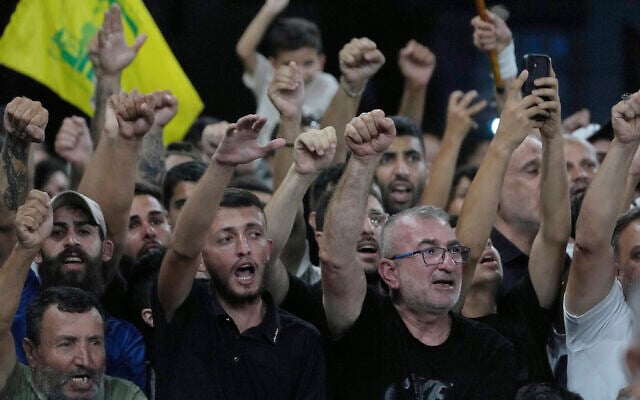 Hezbollah supporters shout slogans as Iranian Supreme National Security Council Secretary Ali Larijani arrives to visit the grave of former Hezbollah leader Sayyed Hassan Nasrallah in Beirut, Lebanon, Wednesday, Aug. 13, 2025. (AP Photo/Hussein Malla)
Hezbollah supporters shout slogans as Iranian Supreme National Security Council Secretary Ali Larijani arrives to visit the grave of former Hezbollah leader Sayyed Hassan Nasrallah in Beirut, Lebanon, Wednesday, Aug. 13, 2025. (AP Photo/Hussein Malla)“The resistance will not surrender its weapons while aggression continues, occupation persists, and we will fight it… If necessary to confront this American-Israeli project, no matter the cost.”
He urged the government “not to hand over the country to an insatiable Israeli aggressor or an American tyrant with limitless greed,” adding the state would “bear responsibility for any internal explosion and any destruction of Lebanon.”
Salam later denounced the remarks, saying on X that they “constitute an implicit threat of civil war.”
He added that “any threat or intimidation related to such a war is totally unacceptable.”
Salam also hit back at Hezbollah’s characterization of the disarmament push as an American-Israeli effort.
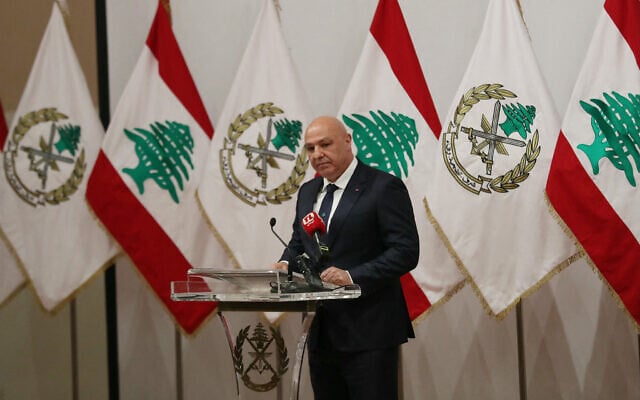 A handout picture provided by the Lebanese Presidency shows Lebanon’s President Joseph Aoun delivering a speech on the eve of Army Day at the Ministry of Defense in Yarze on July 31, 2025. (Lebanese Presidency / AFP)
A handout picture provided by the Lebanese Presidency shows Lebanon’s President Joseph Aoun delivering a speech on the eve of Army Day at the Ministry of Defense in Yarze on July 31, 2025. (Lebanese Presidency / AFP)“Our decisions are purely Lebanese, made by our cabinet, and no one tells us what to do,” he said.
“The Lebanese have the right to stability and security… without which the country will not be able to recover, and no reconstruction or investment will take place.”
Before the war with Israel, Hezbollah was believed to be better armed than the Lebanese military.
 Hezbollah supporters shout slogans as Iranian Supreme National Security Council Secretary Ali Larijani arrives to visit the grave of former Hezbollah leader Sayyed Hassan Nasrallah in Beirut, Lebanon, Wednesday, Aug. 13, 2025. (AP Photo/Hussein Malla)
Hezbollah supporters shout slogans as Iranian Supreme National Security Council Secretary Ali Larijani arrives to visit the grave of former Hezbollah leader Sayyed Hassan Nasrallah in Beirut, Lebanon, Wednesday, Aug. 13, 2025. (AP Photo/Hussein Malla)“The resistance will not surrender its weapons while aggression continues, occupation persists, and we will fight it… If necessary to confront this American-Israeli project, no matter the cost.”
He urged the government “not to hand over the country to an insatiable Israeli aggressor or an American tyrant with limitless greed,” adding the state would “bear responsibility for any internal explosion and any destruction of Lebanon.”
Salam later denounced the remarks, saying on X that they “constitute an implicit threat of civil war.”
He added that “any threat or intimidation related to such a war is totally unacceptable.”
Salam also hit back at Hezbollah’s characterization of the disarmament push as an American-Israeli effort.
 A handout picture provided by the Lebanese Presidency shows Lebanon’s President Joseph Aoun delivering a speech on the eve of Army Day at the Ministry of Defense in Yarze on July 31, 2025. (Lebanese Presidency / AFP)
A handout picture provided by the Lebanese Presidency shows Lebanon’s President Joseph Aoun delivering a speech on the eve of Army Day at the Ministry of Defense in Yarze on July 31, 2025. (Lebanese Presidency / AFP)“Our decisions are purely Lebanese, made by our cabinet, and no one tells us what to do,” he said.
“The Lebanese have the right to stability and security… without which the country will not be able to recover, and no reconstruction or investment will take place.”
Before the war with Israel, Hezbollah was believed to be better armed than the Lebanese military.
Syria’s Sharaa accuses Israel of trying to ‘gain power’ as protesters wave Israeli flag
Syrian President Ahmed al-Sharaa says the battle to unify his country after years of civil war “should not be with blood,” rejecting any partition and accusing Israel of meddling in the south.
His remarks come as hundreds demonstrated in south Syria’s Sweida province on Saturday, denouncing sectarian violence last month that drew in Israeli airstrikes and calling for the right to self-determination for the Druze-majority province.
At the protest, some demonstrators waved the Israeli flag and called for self-determination for the region.
Sharaa’s remarks are released today by Syrian state TV.
“We still have another battle ahead of us to unify Syria, and it should not be with blood and military force… it should be through some kind of understanding because Syria is tired of war,” Sharaa said during a dialogue session involving notables from the northwest province of Idlib and other senior officials.
“I do not see Syria as at risk of division. Some people desire a process of dividing Syria and trying to establish cantons… this matter is impossible,” he said according to a recording of the meeting, distributed overnight by state media.
“Some parties seek to gain power through regional power, Israel or others. This is also extremely difficult and cannot be implemented,” he said.
A week of bloodshed in Sweida began on July 13 with clashes between Druze fighters and Sunni Bedouin, but rapidly escalated, drawing in government forces, with Israel also carrying out strikes.
Syrian authorities have said their forces intervened to stop the clashes, but witnesses, Druze factions and the Syrian Observatory for Human Rights have accused them of siding with the Bedouin and committing abuses against the Druze, including summary executions.
Sharaa said that Sweida “witnessed many violations from all sides… some members of the security forces and army in Syria also carried out some violations.”
The state is required “to hold all perpetrators of violations to account,” whatever their affiliation, he added.
“Israel is intervening directly in Sweida, seeking to implement policies aimed at weakening the state in general or finding excuses to interfere in ongoing policies in the southern region,” Sharaa said.
Israel, which has its own Druze community, has said it has acted to defend the minority group as well as enforce its demands for the demilitarization of southern Syria. video Israel has an opportunity with Syria that we have never had before. Instead of continuing to act as an adversary, we should be looking at how we can help Sharaa stabilize the country while preventing bloodshed, not just against the Syrian Druze community but also against the Kurds and other minorities. We could be seen as a friend and perhaps, an ally by many if we took a different tack. Of course, that route is a difficult one, but in planning and in action but it is worth the efforts and can have an everlasting impact on relations between our two countries. Instead, we are only showing our military might and aiding the destabilization of the country. Chaos is not our friend. Chaos is an invitation to other actors in the region and beyond to place themselves inside of Syria in positions of strength as 'friends' of Sharaa and Syria and purposely leaving us as the outsiders and the still enemy. Right now, Turkey is filling the void we are abandoning, as is Russia and this will come back to haunt us. Turkey, under Erdogan has become a strong adversary of Israel, where once the friendship was incredibly strong. Russia is a country that we need to have on our side, to a certain degree but Putin is dangerous and he is our so-called 'friend' only when it serves him, making Russia an unpredictable player. And we should never forget that almost all of Syrian's military strength under both Assads was supplied by Russia. The bottom line remains that we are missing every opportunity with the new Syria because we don't have the leadership that is capable of diplomacy and grabbing opportunities that are right in front of our faces.
Gaza and the South

"They will not forgive me, I failed": the responsibility and the rumors – the recordings of Haliva are revealed
Head of Military Intelligence Aharon Haliva concluded days before October 7, again, that Hamas is deterred. This fact and further details, Haliva revealed in conversations he held recently and were exposed this evening on "Ulpan Shishi."
"It was not I who brought Qatari money," he jabs, and calls on the leadership to take responsibility and resign – and also responds to the rumors about his nightly outing between October 6 and 7. Exclusive
The responsibility and the rumors – the recordings of Haliva are revealed Head of Military Intelligence Aharon Haliva concluded days before October 7, again, that Hamas is deterred. This fact and further details, Haliva revealed in conversations he held recently and were exposed this evening on "Ulpan Shishi."
"Whoever chooses to go into leadership positions knows that his decisions have great successes and also great failures… I took responsibility. For such a tragic – biblical – event and such a catastrophic national disaster, there is enough responsibility for everyone. You cannot say personal example as a value, put it as a sticker on the wall, but your behavior is not like that. You cannot. People need to go home so that the wheat can grow again. Go, go." "It is not a matter of smugness and arrogance, it is deeper than that. There is responsibility here over the years of organizational culture, of a perception that says: 'We are the State of Israel, we have very strong intelligence, Shin Bet, Mossad, Military Intelligence, ta-ta-ta. We have very strong military power, we have observations, we have everything, our enemy is deterred. In parallel we will calm him with Qatari money'." Like this we have not yet heard Aharon Haliva. In fact, we have not heard him at all until today. Major General Aharon Haliva, Head of Military Intelligence in the failure of October 7, left his position exactly a year ago, August 2024. Until today we did not receive an explanation for the hardest intelligence failure, it seems, in the history of the state – some will even say more than that of the Yom Kippur War. Haliva speaks in these recordings, revealed for the first time on "Ulpan Shishi," also about the degree of personal responsibility of the former Chief of Staff: "What do you think, that Herzi is negligent? Herzi is not a negligent person. Herzi is a paranoid person. I know Herzi since he was this small, he is paranoid God save." And if Herzi Halevi he calls paranoid, see what he says about Prime Minister Benjamin Netanyahu: "He is a person who listens, he is a person who reads, and it is also possible to say that he is a very cowardly person – in the end in the test of result he failed." And he also speaks, of course, about the rumors where and with whom he was the night before: "There were rumors that I was at night with Keren Peles. I was not drunk, I never drink alcohol." These statements were recorded in the recent months in various conversations Haliva held. They are broadcast and published of course with the approval of the censorship, and in them Haliva speaks about everything openly, freely, almost without account – and admits explicitly that there was a conception and arrogance in the army and in the government. The Haliva document, we begin. The ceremony in the Intelligence Directorate
The intelligence failure "(They say that) October 7 was an accident. We are the best army in the world, we are the best state in the world. Here, see the beepers – today I entered some place and they told me 'we heard that all the beepers are thanks to you.' I told them 'guys, nothing is thanks to me.' It is not because of me or thanks to me, it is not at all the matter, it is not at all human beings, it is something much deeper over very many years, that requires a much deeper correction. It is not a matter of personal correction – 'we will now replace a Chief of Staff here and everything will return to be good.' I am against the phenomenon that says that this was an accident: so it is, you drove with the car, went over spikes, we will bring a vehicle, replace four wheels and continue to drive. There are those who say: 'this is what happened to us.' I claim that what happened to us requires dismantling and assembling. For what is one of the hardest problems of the intelligence? That the intelligence until October 7 said 'I am omnipotent.' It is not a matter of smugness and arrogance, it is deeper than that.
"I said about the Yom Kippur War that it could happen again." "When they asked me several times, in events of 50 years to Yom Kippur, if it could happen again – I said 'yes, yes, it could happen again.' Because I know what happened in Pearl Harbor, I know what happened on 9.11, I know what happened in the Yom Kippur War and it could happen again. I also say to you – today it can happen again. "So they told me 'say, why do you do all the studying and all the lessons?'. I said, 'you know why? So that it will not happen once in 50 years, that it will happen once in 100 years. If I will succeed to leap it not once in 50 years, but to once in 100 years…' There is some tendency in the recent months, someone inside the system told me: 'it is all the intelligence’s fault. We, the operational side, are not guilty in anything – the commanders suddenly blind and the intelligence is a guide dog. The dog did not guide us, so we crashed into the wall'." "I am against the phenomenon that says that this was an accident."
The night before "The SIM cards light up already at nine in the evening on Friday. The first and last call I receive at night is at 3:20 from my assistant." When asked if they updated him that the SIM cards lit up, he replied: "Not me. They speak with the Southern Command commander, who calls the head of division in the Shin Bet, they make a Shin Bet call, they every time think how to do, what is happening. There is a Shin Bet document from 3:30 in the morning that says 'this is it, this went, this right, this left. We assess that the understandings are preserved. "What do you think, that Herzi is negligent? Herzi is not a negligent person. Herzi is a paranoid person. I know Herzi since he was this small, he is paranoid God save. So that he sets a situation assessment at 8:30 in the morning, that means that everyone who fed him – and it was not me – gave him a feeling that there is an unusual occurrence, it is not immediate. They say 'say, at night the Chief of Staff did not wake you up and nothing?', I say: listen well, I can say – 'one side did not wake me, he is guilty, he is responsible, if he had woken me…' My assistant called me once, told me there is an occurrence, XXX that is Southern Command intelligence officer and XXX that is responsible for the operations brigade are handling it, and 'if there will be something special, I will wake you again.' That is all.
A lone tank against hundreds of terrorists on the morning of 7.10 "There are Shin Bet documents from the night that say – in our assessment the quiet will be preserved, there is nothing. Everything is documented, it is not the matter. I think the night is not relevant. When you enter a certain night with such a strong conception that the intelligence will provide you the intelligence, if I on every intelligence report will do something... according to isolated reports now Iran has ten nuclear bombs, it does not work like that, it does not work like that. Do you know how many isolated reports there are all the time? Intelligence is one big crazy puzzle. If on every such report you will do something, you need to hold in the IDF every day 300 thousand reservists – in Judea and Samaria, in Lebanon, in Syria. Intelligence is a crazy world. They told me that Gallant said 'if they had woken me at night'... and I said straight 'guys, even if the Chief of Staff had woken me at night, I would say that I accept the assessments of the division intelligence officer and the command intelligence officer and the Shin Bet. Anyone who says something else – liar. Liar." At this so significant point, in the night between October 6 and 7, Haliva says that even if all the intelligence information was before him and they had woken him to that phone call with the Chief of Staff he would have said "everything is fine, I go back to sleep." And what does Haliva say about the malicious rumors? Where did he spend this night between October 6 and 7? "Do not worry, I did not ****** at night with Keren Peles although they attributed to me ****** with Keren Peles at night. There were rumors that I was with Keren Peles in Eilat. I said that I was with two women that night – I fell asleep with my daughter Ariel beside me, and my wife. I was not drunk, I never drink alcohol, but even if they had woken me and put me on the line – anyone who thinks that the night is the symptom, understands nothing of his life."Haliva believed that Hamas is deterred, and when talking with close people he did not hide that he fears that an investigation into the failures of the Seventh of October will be directed at him. But at the same time he noted that the prime minister, Benjamin Netanyahu, is not exempt from responsibility. In the conversations he held with those close to him, Haliva returned to the same point: that Netanyahu did not convene the cabinet in the days before the Seventh of October, and did not give an order to change the level of alert in the Gaza Division, even after an intelligence officer in the Southern Command had already marked the plan of Hamas as concrete and real. Haliva insisted that in the meetings with Netanyahu before the massacre, he made clear to him that the army is ready for war, if such will erupt. According to him, the prime minister heard this, and did not act to increase readiness.
Those who listened to the recordings were left with the impression that the chief of Military Intelligence was mainly concerned with what is going to be said about him, and what the public image of his responsibility for the failure will be. In some of the conversations he said about himself: "I failed, they will not forgive me," but emphasized that the heavy responsibility does not rest only on his shoulders. At the same time, he spread rumors, some of which were unfounded, about other senior officials who, in his view, should also bear responsibility. Thus, for example, he told of the intelligence officer in the Southern Command, Colonel Shlomi Binder, who warned in writing on the eve of the Seventh of October that Hamas intends to carry out a surprise attack. Haliva described him in those conversations as someone who "is now building a political career on my back."
In another conversation, Haliva hinted that he believes that Netanyahu intends to throw him to the dogs, and to present him as the central responsible for the failure. "I have no political protection," he said. "The prime minister is trying to put everything on me."
At the same time, he also directed criticism at the Chief of Staff, Herzi Halevi. According to Haliva, Halevi also ignored the intelligence officer's warning in the Southern Command, and did not change the alert level in the Gaza Division. In his assessment, the Chief of Staff is trying to place the failure on Military Intelligence alone, and not on himself.
Close associates who spoke with Haliva in recent months testified that he went through a very difficult emotional period, and did not sleep well. The sense of failure, together with the voices of the bereaved families who demanded his resignation, pressed heavily on him. At a certain point, he told his close associates that he intended to announce that he will resign immediately, but the Chief of Staff and other senior officials in the defense establishment convinced him to stay until the end of the war, so that the system will not be destabilized in the middle of the fighting.
"Those who failed must go home," said Haliva to his close associates more than once. "I am going home. I cannot look in the eyes of the families. I failed them."
On the other hand, he did not hide his bitterness about Netanyahu. According to him, the prime minister, who knew in real time about the possibility of an attack, did not take the necessary steps, and therefore he cannot absolve himself of responsibility. In one of the conversations, Haliva said that if a state commission of inquiry is established, "the truth will come out, and then everyone will know what each one knew, and what he did or did not do."
Meanwhile, in the political system and in the defense establishment, questions are asked about the very existence of those recordings, and who leaked them. Senior officials said that Haliva should never have shared such things in a recorded way, certainly not during the war. Others argued that the leak was intended to harm him and to present him as someone who is more concerned about his image and personal responsibility than about the war effort.
Colonel (res.) Ronen Itzhaki, who served in the past in senior positions in Military Intelligence, said in response: "It is important to say honestly — Haliva is not the only one who failed. Many failed, in all levels, and the prime minister also has responsibility. The recordings may paint him as self-absorbed, but his words about responsibility are true. There is no single responsible person for the failure of the Seventh of October. It is a collective failure." link There is not doubt that Haliva failed, as did most of the senior Security people in all of the organizations. There is also no doubt that the entire political leadership echelon failed completely and most of all, the one who heads it all, Netanyahu. He has been prime minister for most of the last two decades but never ever takes responsibility for any failure that occurs during his watch. US President Harry Truman had a sign on his desk in the White House "The buck stops here" which meant that everything that happened in his administration was ultimately his responsibility, for good or for bad. For Netanyahu, it is exactly the opposite. His sign would read "The buck only stops here when it serves me positively". And we have seen this in everything that happens. When the army successfully rescued a few hostages, he immediately called them on the phone and it was with lots of media coverage. When bodies of hostages were recovered, what did we hear from Netanyahu? Crickets! Nada! Zilch! He never wants to be associated with anything negative especially when his direct responsibility is so clear. As Haliva said "Netanyahu is a coward!"
Netanyahu rejects partial Gaza deal, demands release of all hostages in single agreement
Hamas accuses Israel of creeping assault on Gaza City as Israel readies tents and shelters to push civilians south; PM sets terms for any deal, signaling rejection of a partial agreement
Prime Minister Benjamin Netanyahu said Saturday night he would not agree to a partial deal with Hamas, insisting that any agreement must include the release of all hostages held in Gaza at once and meet Israel’s conditions for ending the war.“We will agree to an agreement only if all the hostages are released in one phase and according to our terms,” Netanyahu’s office said in a statement, listing those terms as the disarmament of Hamas, the demilitarization of Gaza, continued Israeli security control over the territory’s perimeter and the installation of an alternative governing authority that is neither Hamas nor the Palestinian Authority.His remarks came after Hamas signaled through Egyptian and Qatari mediators that it was prepared to discuss a partial deal, while still demanding that any release of hostages be tied to a full Israeli withdrawal from Gaza and the end of the war.Until Netanyahu’s declaration, Israeli officials had maintained ambiguity about the possibility of a limited agreement, leaving the impression that despite tough rhetoric, the government might ultimately accept one.Meanwhile, Israel announced it will begin transferring tents and shelter equipment into southern Gaza starting Sunday, as part of preparations for a large-scale operation to capture Gaza City. The Coordinator of Government Activities in the Territories, the Defense Ministry unit responsible for civilian affairs, said the aid will be delivered through the Kerem Shalom crossing by the United Nations and international groups after Israeli security inspections.“This assistance is being provided to facilitate the movement of Gaza’s civilian population away from combat zones to the south for their protection,” the office said, adding that the IDF will continue to act in line with international law.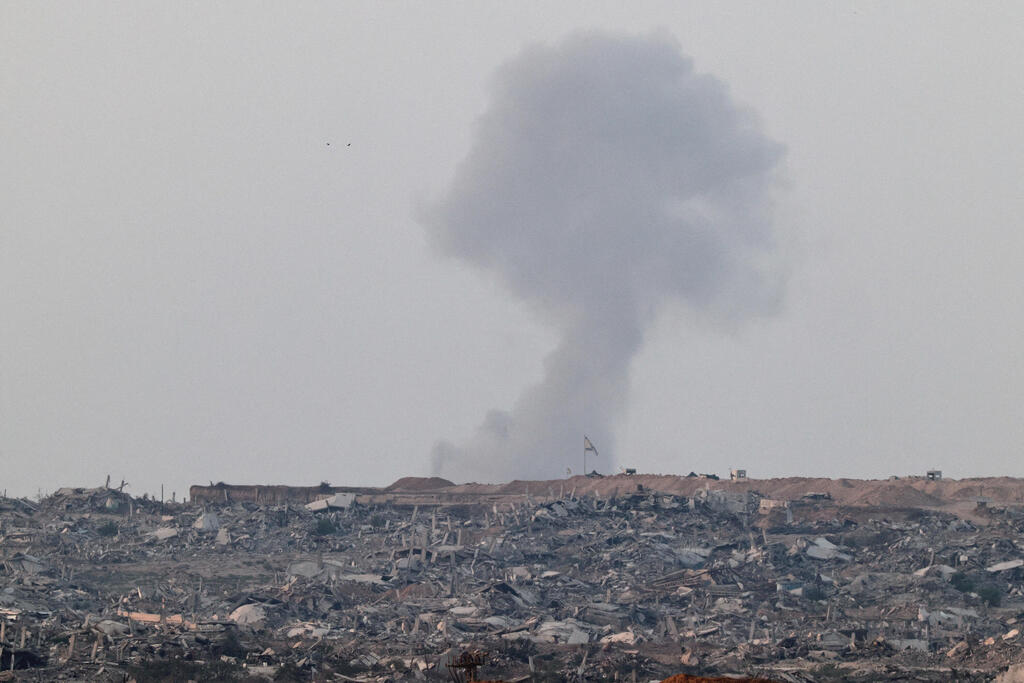 (Photo: REUTERS/Amir Cohen)Hamas accused Israel of already beginning the Gaza City offensive, saying airstrikes and artillery fire in recent days have devastated neighborhoods such as Zeitoun in the city’s south and east. The group described the strikes as part of a “systematic war of extermination” and urged the international community to intervene.Talks in Cairo and Doha have shown no breakthrough, but negotiations are continuing as Israel signals preparations for a ground takeover of Gaza City.At the same time, thousands rallied across Israel Saturday demanding the hostages’ release, including at the weekly protest in Tel Aviv’s Hostages Square. On Sunday, families of hostages are set to lead a nationwide “people’s strike,” with growing support from private companies, universities and local councils. Link
(Photo: REUTERS/Amir Cohen)Hamas accused Israel of already beginning the Gaza City offensive, saying airstrikes and artillery fire in recent days have devastated neighborhoods such as Zeitoun in the city’s south and east. The group described the strikes as part of a “systematic war of extermination” and urged the international community to intervene.Talks in Cairo and Doha have shown no breakthrough, but negotiations are continuing as Israel signals preparations for a ground takeover of Gaza City.At the same time, thousands rallied across Israel Saturday demanding the hostages’ release, including at the weekly protest in Tel Aviv’s Hostages Square. On Sunday, families of hostages are set to lead a nationwide “people’s strike,” with growing support from private companies, universities and local councils. Link
- The Region and the World
IDF confirms strike on Yemeni power plant ‘used by the Houthi terror regime’
The IDF, in a statement, confirms carrying out a strike against “energy infrastructure used by the Houthi terror regime” near the Yemeni capital of Sanaa this morning.
The strike was carried out by Israeli Navy missile boats, according to a defense official. Explosions were reported earlier at a power plant in the area.
“The strikes were conducted in response to repeated attacks by the Houthi terrorist regime against the State of Israel and its citizens, including the launching of surface-to-surface missiles and UAVs toward Israeli territory,” the IDF says.
Since the last Israeli strike on Yemen on July 21, the Iran-backed Houthis have launched at least seven ballistic missiles and seven drones at Israel.
Acronyms and Glossary
ICC - International Criminal Court in the Hague
IJC - International Court of Justice in the Hague
MDA - Magen David Adom - Israel Ambulance Corp
PA - Palestinian Authority - President Mahmud Abbas, aka Abu Mazen
PMO- Prime Minister's Office
UAV - Unmanned Aerial vehicle, Drone. Could be used for surveillance and reconnaissance, or be weaponized with missiles or contain explosives for 'suicide' explosion mission
Join my Whatsapp update group https://chat.whatsapp.com/IQ3OtwE6ydxBeBAxWNziB0
Twitter - @LonnyB58 Bluesky - @lonny-b.bsky.social
My blogs in The Times of Israel my blogs
Substack - https://lonnyb.substack.com/
Twitter - @LonnyB58
My blogs in The Times of Israel my blogs
Substack - https://lonnyb.substack.com/




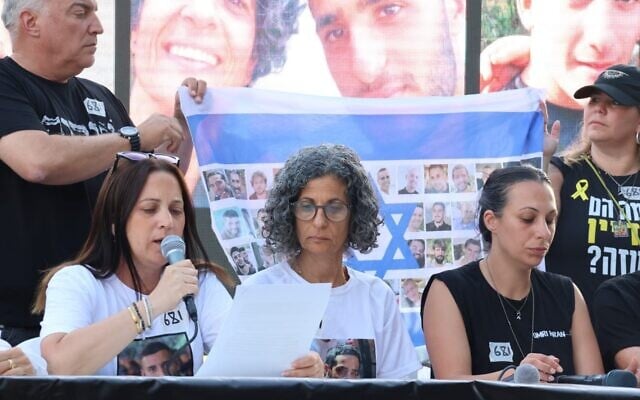
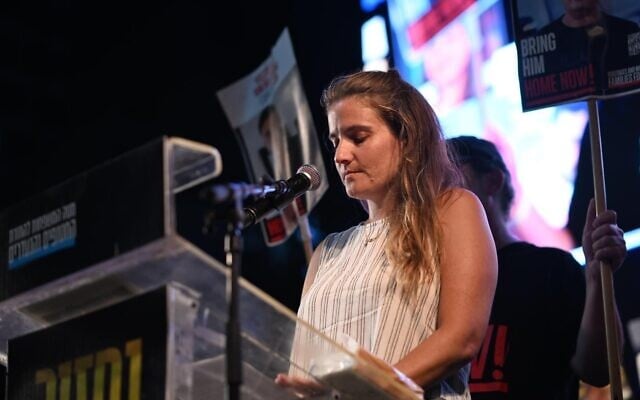
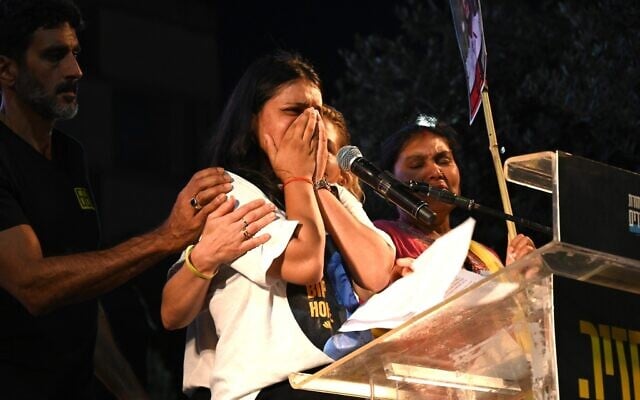
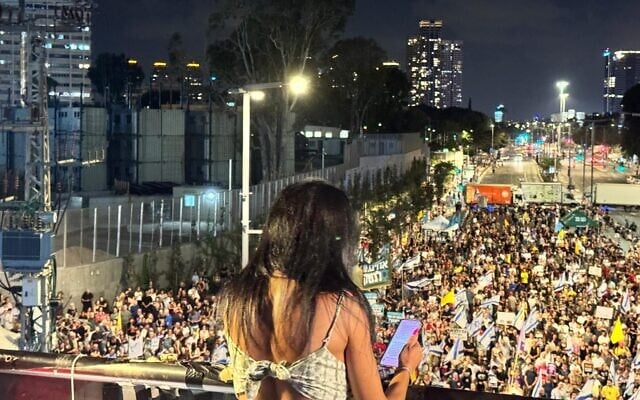
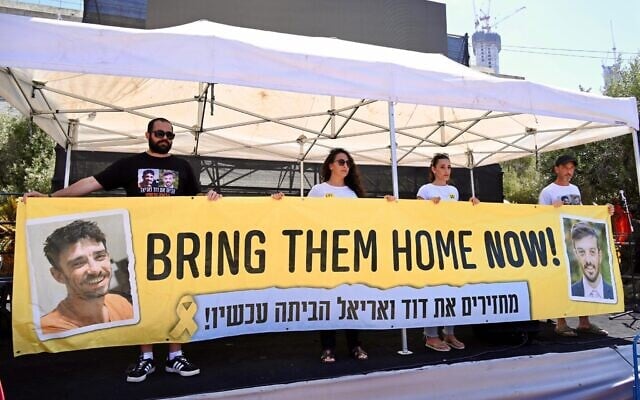
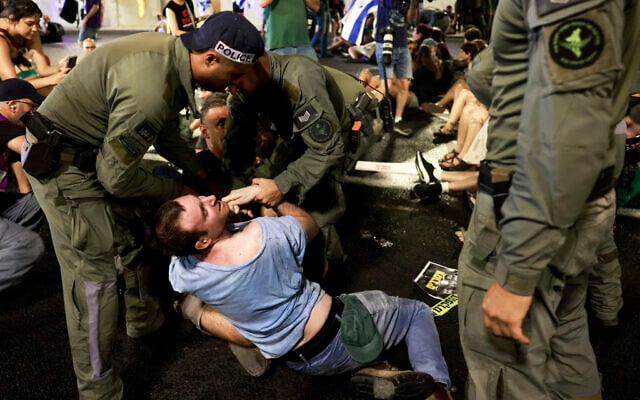

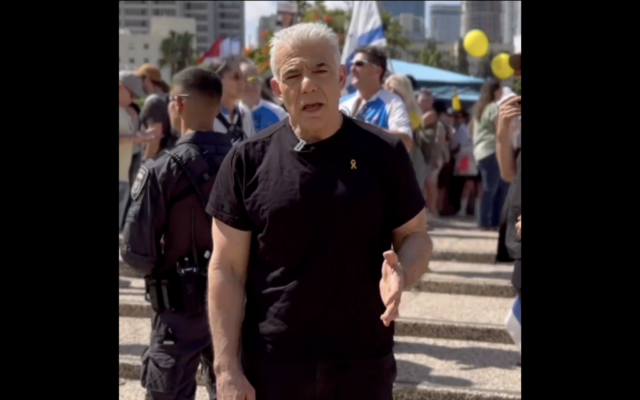
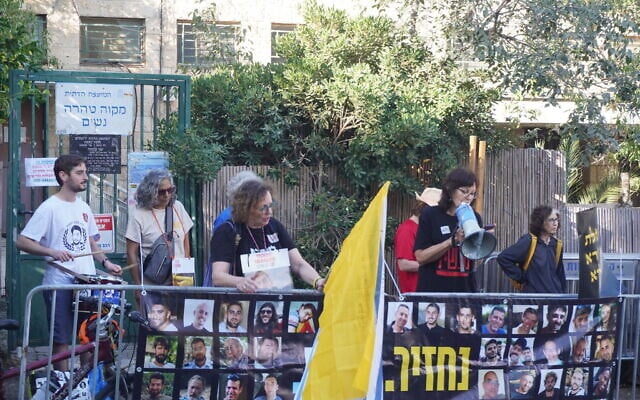
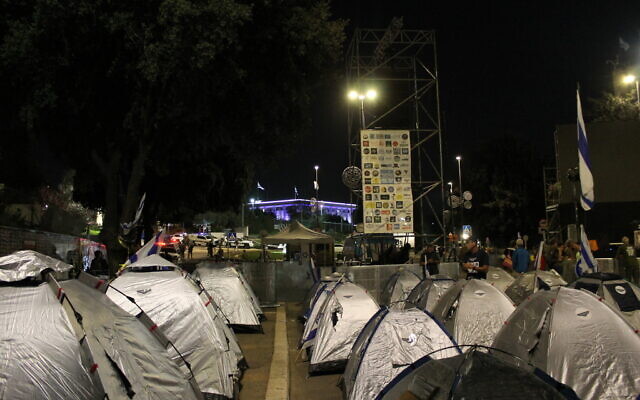

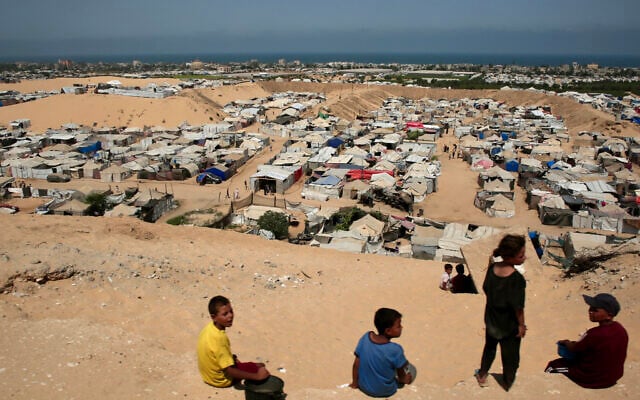
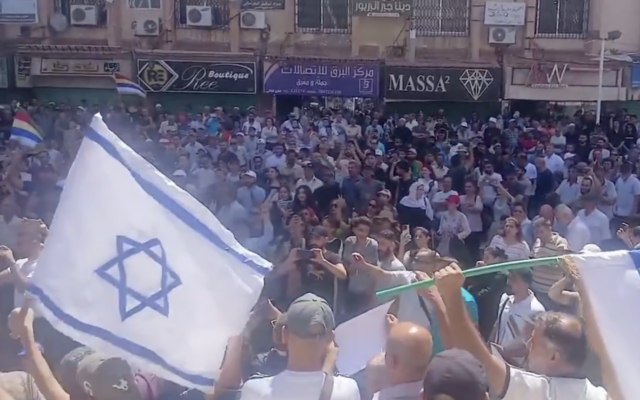


Comments
Post a Comment